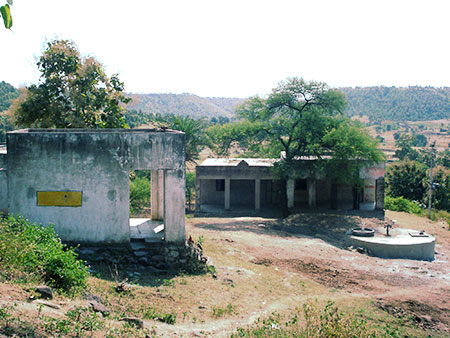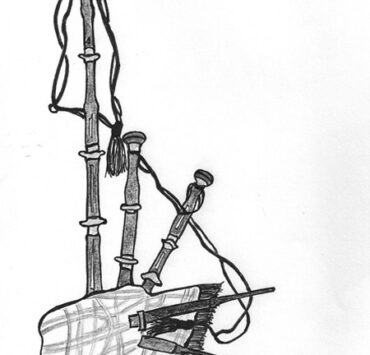When Jaani grins, her warmth is infectious and my face can’t help but mirror hers. She has five front teeth left now—“Old age has robbed the others,” she tells me very seriously, her eyes threatening to laugh again. Widowed three years ago, she lives with her son and daughter-in-law and their son, a little chap named, of all things, Shaitan Singh.
“How old are you, Amma?”
I have to shout so that she can hear me properly. She falls into silence and I am not perturbed by this. I have often found that against the rural landscape, where time takes on another pace, numbers like age have a way of being forgotten. As if, in a place where time is measured by the passing of seasons and the position of the sun in the sky, remembering one’s age is hardly worthwhile. She finally decides to give me an answer, “Sixty or so.” I smile and dutifully note down the answer. My aide, a regular social worker in the area shouts at her affectionately, “Dukariya (old woman) you’ve got one leg in the grave and yet you say you’re only sixty! You must be at least eighty.” She looks back defiantly and I see sparks of the feisty thing she must have been in her youth. “Are you asking the questions or is she? Don’t interrupt us.” That silences him for a while and I carry on.

The deserted school. Photograph by Chandni Singh.
“So do you avail of the government’s old age pension scheme?”
Her eyes have mucous in them, the greenish-yellow residue has collected at the corners. She keeps swatting off a pesky fly that tries to sit on her face. I knew the Rs 1,000 per month that the scheme provided could be a handy addition to the household income.
“Yes, my name is on the rolls. I get some money.”
“How much?”
“Some months I get 1,000, some months only 500. This time I got 800 for two months. It keeps changing.”
“Changing?” I feared I knew what the answer was but ploughed on, “How so?”
Shaitan Singh, ever eager to join the ‘elders’ in their conversation, quips in, “Postmaster ji brings us the money. He says that sometimes the government doesn’t send the money and if nothing comes from above, how can he deliver the pension to us?”
My aide whispered, “The postmaster is famous for pocketing some of the pension. But no one complains against him because they know nothing will happen.” I knew I was just scratching the surface of the canker of corruption that has invaded every system of my country. I turn to Shaitan Singh.
“Do you go to school?”
“Yes.”
“Which class?”
“Class Two.” He says this in English. Suddenly, realising he is the focus of the conversation, he’s standing straight, in attention, his little hands clenched into fists by his sides, his wide, round eyes, attentive. His forehead is creased into a concentrated frown, this is serious business for him.
“So why are you not in school today?”
“I didn’t go because I am in charge of looking after the soyabean crop that has been cut and left in the fields.”
“Did you go yesterday?”
“No, I haven’t gone for the past five days. But it’s okay. Masterji hasn’t been coming either. And if he doesn’t come, what is the use of going? We don’t even get any food then.”
I nod reluctantly, understanding the import of his words. The government-funded midday meal scheme provides one meal a day to schoolchildren and serves the double purpose of giving parents an incentive to send their children to school as well as fighting malnutrition by providing a nutritive meal to growing children. The scheme, though well-meaning, has been seen as another opportunity to siphon off funds and had a murky history of missing meals, sub-standard provisions, rice with more stones than grain and other such woeful tales. Here, however, Shaitan Singh alluded to the fact that the master was absent from the school when he pleased, and without anyone to distribute the food, the scheme was dysfunctional.
Later, acutely disturbed with the scale at which systems were being routinely subverted, and the nonchalance with which everyone accepted it as ‘normal’ I questioned an official. He smiled at my supposed naivety and explained:
“The benefit that actually reaches a B.P.L. family depends on their relation with the ward member who is elected at the village level. But that is not enough. The ward member must have a voice in the Gram Sabha which must be then presented further in the Panchayat Samiti. All this is a delicate balance of how much power you have, how well you have been oiling the system, and of course, how much clout you have. Most of all you have to pray that as the money moves downwards from the Centre to the state through the district and block levels to reach the village, that enough of it trickles down, without being diverted into ‘other’ channels, if you know what I mean. And of course as the list of B.P.L. families moves up the hierarchical ladder, you must hope that your name makes it all the way. Frankly, it is less your actual depravity and more your networks and how you milk your contacts that get you the ‘free’ seed and fertilizer, or in this case your pension.”
It was the answer I knew and yet, I had been hoping to hear something different. For all the money being poured into various poor-oriented schemes, the mechanisms to deliver the benefits were as ill-equipped as earlier. The change we need is not in the amounts being spent but the channels it is flowing through.
I think back to my conversation and Jaani’s nearly toothless grin. Her smile, reflected in Shaitan Singh’s round eyes. I had been asking about the new enikat (small dam) across the village stream and how the rain water collected in it had been used. Holding rain water for longer periods, the structure was particularly helpful during the lean summer months. It also checked the stream banks from eroding when the monsoons are particularly bountiful. Seeing I was hell bent on knowing all about the enikat, as I was leaving Shaitan Singh shouted out: “Didi! Dekho!” And with a brilliant display of showmanship, he jumped into the pooled water, his little limbs paddling furiously in the water. I laughed, and saw Jaani looking at his youthful mirth wistfully. I knew from my conversation that, like her pension, water in this land was unreliable. In a few months this pool would be dry.









Amazing, as always.
Thanks again Chandni. I enjoyed this one too. Poor granny being conned of her pension. India’s system reminds me so much of Zimbabwe and I wonder when and how the corruption will end so that the old can get their dues and the young can get what they deserve also… a simple meal at school daily can go a long way to educating a village…
In the meantime, please keep educating us!